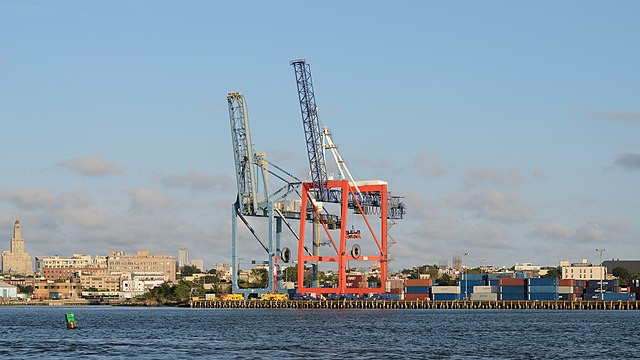A historic strike by nearly 50,000 members of the International Longshoremen's Association (ILA) began early Tuesday, halting operations at East and Gulf Coast ports and raising alarms about potential shortages and rising prices. The work stoppage, which is the first coast-wide strike in nearly half a century, could significantly disrupt the flow of essential goods and trade throughout the United States.
The strike commenced at midnight and affects almost all cargo ports from Maine to Texas, impacting the movement of a wide variety of goods, including perishable items like bananas, furniture, clothing, and even parts essential for U.S. factories. According to ILA President Harold Daggett, the strike was initiated in response to what he described as an unacceptable wage offer from the United States Maritime Alliance (USMX). "We are prepared to fight as long as necessary," Daggett stated, emphasizing the need for fair compensation in light of the profits generated by foreign-owned shipping lines.
The USMX, which represents major shipping lines and terminal operators, had reportedly not met in person with the ILA since June, creating a significant rift in negotiations. While the USMX claimed to have increased its wage offer to a more than 50% increase over the proposed six-year contract, the ILA rejected it, seeking annual pay raises totaling 77% throughout the contract's duration. The situation has drawn concern from both business groups and economists, who warn of possible economic repercussions if the strike continues.
Economists are closely monitoring the situation, noting that the strike could lead to shortages of consumer and industrial goods, particularly perishable items, which are time-sensitive and cannot be stored long-term. For instance, approximately 1.2 million metric tons of bananas and a significant portion of imported alcohol pass through the affected ports. Experts predict that shortages could begin appearing within weeks if the strike persists.
Lisa DeNight, managing director at Newmark, highlighted the unpredictable nature of such strikes. "If this strike goes on for a couple of days, the implications are rather short-lived," she explained. "If this drags on, it has cascading impacts throughout the global economy-not just the U.S. economy."
Retailers have been on alert for weeks, rushing to secure inventories ahead of the anticipated strike, which was public knowledge for months. Fortunately, many holiday goods are already stocked, as retailers typically import 70% of their seasonal items by this time of year. However, shortages of perishable goods could quickly affect prices, leading to increased costs for consumers.
The Biden administration has expressed its intention to monitor the situation closely. However, President Biden has stated that he does not plan to invoke the Taft-Hartley Act, which would allow him to intervene in labor disputes for national security reasons. "It's collective bargaining, and I don't believe in Taft-Hartley," he asserted.
In the meantime, the White House has urged both sides to negotiate in good faith to reach a resolution. A spokesperson stated that senior officials continue to work around the clock to facilitate dialogue. Still, the uncertainty surrounding the strike has led many businesses to prepare for a potentially prolonged disruption.
Shipping giants like Maersk have warned that just a one-week shutdown could lead to significant backlogs, affecting logistics and costs. "A longer dispute may exacerbate disruptions," the company said in a statement, suggesting that a lengthy work stoppage could take weeks to recover from, further complicating the already strained supply chain landscape.
As the strike unfolds, the implications for the economy could be severe, particularly as businesses brace for potential disruptions in supply chains that have already been tested by recent global events. The National Association of Manufacturers has voiced strong concerns about the potential fallout, emphasizing that billions of dollars' worth of goods depend on the smooth operation of East and Gulf Coast ports.
Overall, the ILA's strike against the USMX represents a pivotal moment for labor relations in the shipping industry, with repercussions that could extend far beyond the docks. As negotiations remain deadlocked, the focus now shifts to how quickly both sides can find common ground before the situation escalates further.






